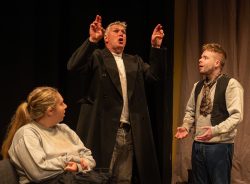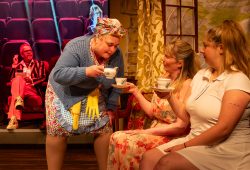 IT is more than 60 years since Tom Stoppard, working as an occasional theatre critic and reporter on the Bristol Evening World, wrote his short play The Real Inspector Hound. The rest is glittering theatrical history.
IT is more than 60 years since Tom Stoppard, working as an occasional theatre critic and reporter on the Bristol Evening World, wrote his short play The Real Inspector Hound. The rest is glittering theatrical history.
But perhaps strangely, out here in the sticks (and I suspect anywhere outside the confines of the M25), it is still remarkably relevant. Perhaps the critics are a little less pompous than in the 1960s, and the productions a little less creaky than that of Murder at Muldoon Manor, but the play has lost none of its bite and it provides splendid opportunities for overacting that almost eclipse classics like Acorn Antiques.
It is the great Julie Walters whose Mrs Overall crown is threatened by Sarah Ambrose – her Mrs Drudge is a mistresspiece of high comedy. Every sinew of her body (especially the area of her face around her mouth) and every constriction of her vocal chords is in perfect tune with the opportunities afforded by this wonderful housekeeping role.
 Mike Stanley’s critic Birdboot, with his Simon Callow-ish sonority and eye for the starlets, is nicely contrasted with the would-be senior critic Moon, encapsulated by the versatile Robert Brydges. David Hallet’s act three entrance as the long anticipated Inspector Hound comes at the moment when the absurdity of the situation is in full bloom. Just when you think “how peculiar that the Canadian Magnus has an accent from Louisiana”, you realise he is not who he seems to be, or even who he seems he seems to be. Tyrone Trower has been given full run of the facial disguise prop box, and he enjoys it.
Mike Stanley’s critic Birdboot, with his Simon Callow-ish sonority and eye for the starlets, is nicely contrasted with the would-be senior critic Moon, encapsulated by the versatile Robert Brydges. David Hallet’s act three entrance as the long anticipated Inspector Hound comes at the moment when the absurdity of the situation is in full bloom. Just when you think “how peculiar that the Canadian Magnus has an accent from Louisiana”, you realise he is not who he seems to be, or even who he seems he seems to be. Tyrone Trower has been given full run of the facial disguise prop box, and he enjoys it.
Special mention must be made of Roger Chadbourne, who unflinchingly gives his all as The Body.
The other three cast members have a busy night. By the time they enter the faux-Christie world of Muldoon Manor they have already performed in the Swan’s opening play, Antony Horowitz’s uncomfortably brilliant and deeply thought-provoking one act play A Handbag. Of course it is based around Oscar Wilde’s classic The Importance of Being Earnest, and is a clever and multi-faceted look at both the title, the provenance and the story of the original.
It opens with a painfully bad rehearsal, with director/Earnest Worthing George and an oddly inanimate Rose as Lady Bracknell going through lines, and a nervy Algernon/Allan coming on in all the wrong places. There’s terrified and stuttering Specs the stage manager, foul mouthed and stroppy Glaswegian Irene (a most unlikely Cecily) and unhappy Kinsey, playing Lane the butler.
It’s quite a long time until the audience realises that these six young people are locked up, probably forever, in what may now be called secure care centres. Horowitz wrote the play in 2011 for the National Theatre’s annual New Connections youth drama festival, and it certainly is both relevant and topical. All of the “actors” have committed dreadful crimes, which are gradually revealed as the rehearsals progress. The story of Jamie Bulger is writ inescapably large over George and Kinsey in this play about forgiveness and redemption.
Dave King, a Swan regular, gives a deeply touching performance as Allan, and Alison Maynard-Griffin, who also does a fine job as Lady Cynthia in the Stoppard play, shows great versatility as the unfortunate Specs. Georgia Holder goes from catatonic monosyllable to accomplished performer as Lady Bracknell and Jack Stevenson is a restrained Kinsey, always looking for reassurance.
Mary Flanagan’s transformation from the violent Irene to the flapping ingenue Felicity is extraordinary. Oddly, the excellent Liam Baird plays approximately the same role in both plays, but manages the barely-controlled aggression in A Handbag with great skill, as he does the louche seducer in Muldoon Manor.
The Swan double bill, directed with subtlety and a keen eye for every comedy moment by Mark and Judith Payne, is already sold out for the entire run, and the audiences are in for another Yeovil treat. And what fun the programme is!
GP-W
Photograph of Sarah Ambrose by Adrian Harding, awaiting production images.